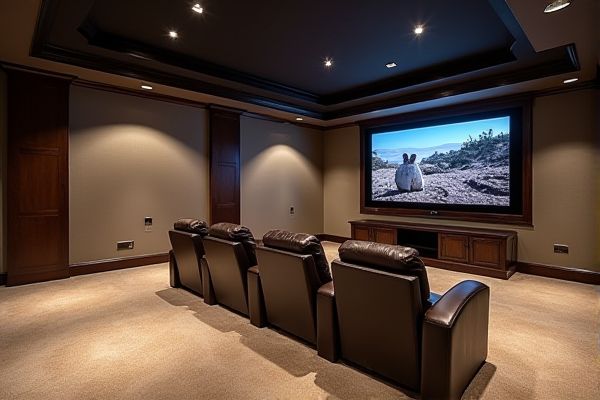
Choosing between a basement gym and a home theater depends on your personal lifestyle priorities and how you envision using your space for fitness or entertainment. Explore this article to discover which option can best enhance Your home's functionality and enjoyment.
Table of Comparison
| Feature | Basement Gym | Home Theater |
|---|---|---|
| Primary Use | Exercise and fitness activities | Watching movies and entertainment |
| Space Requirements | Open area for equipment and movement | Enclosed room with controlled lighting |
| Equipment | Weights, machines, mats | Projector, screen, sound system |
| Noise Level | Moderate to high (equipment usage) | Controlled, immersive sound |
| Lighting | Bright, adjustable for workouts | Dim, optimized for screen visibility |
| Installation Cost | Moderate to high (equipment and flooring) | High (audio-visual systems and seating) |
| Maintenance | Regular equipment upkeep | Occasional AV system checks |
| Health Benefits | Physical fitness, strength, endurance | Mental relaxation and entertainment |
| Customization | Flexible layout for various workouts | Themed decor and advanced technology |
Introduction: Basement Gym vs Home Theater
Basement gyms transform unused space into functional workout areas equipped with cardio machines, free weights, and mirrors to enhance fitness routines. Home theaters convert basements into immersive entertainment zones featuring surround sound systems, high-definition projectors, and reclining seating designed for cinematic experiences. Both options maximize basement potential, catering to wellness enthusiasts or movie lovers seeking customized leisure environments.
Purpose: Fitness Goals or Entertainment Needs
A basement gym is designed to support your fitness goals by providing a dedicated space for workouts, strength training, and cardio exercises, enhancing convenience and motivation. In contrast, a home theater focuses on entertainment needs, offering a comfortable environment optimized for watching movies, gaming, and immersive audio-visual experiences. Choosing between the two depends on whether your priority is physical health or recreational enjoyment.
Space Requirements and Layout Considerations
Basement gyms require open floor space for workout equipment, free weights, and movement, typically needing at least 200 square feet for functionality and safety. Home theaters demand more controlled layouts with wall treatments for acoustics, seating arrangements, and space for projection or screen equipment, often occupying 150 to 300 square feet depending on screen size and seating capacity. Proper zoning in basements ensures efficient use of space, balancing ventilation and lighting needs for gyms against soundproofing and ambient control vital in home theaters.
Initial Setup and Renovation Costs
Basement gym initial setup and renovation costs typically involve purchasing durable flooring, installing mirrors, and purchasing fitness equipment such as treadmills or weights, often ranging from $5,000 to $20,000 depending on the equipment quality. Home theater costs focus on acoustic treatments, high-quality projection or large-screen TVs, surround sound systems, and comfortable seating, typically totaling between $10,000 and $30,000. Renovation expenses for both can include structural modifications, electrical work, and lighting upgrades, but home theaters generally require more specialized soundproofing and technical installation, increasing overall expenses.
Equipment and Installation Essentials
A basement gym requires durable exercise equipment such as treadmills, free weights, resistance bands, and proper flooring like rubber mats to ensure safety and functionality. Home theaters demand high-quality audiovisual gear, including a 4K projector or large LED screen, surround sound speakers, and acoustic paneling for optimal sound insulation. Installation for a gym focuses on space optimization and ventilation, whereas a home theater requires controlled lighting and wiring for seamless connectivity.
Maintenance and Upkeep Needs
Basement gyms require regular cleaning of equipment, floor surfaces, and ventilation systems to prevent dust buildup and maintain air quality, while home theaters demand consistent upkeep of electronics, screen calibration, and sound system tuning to ensure optimal performance. Moisture control is critical in both settings to avoid mold growth, with basement gyms often needing more frequent attention due to sweat and humidity. Scheduling routine inspections and timely repairs prolongs the lifespan of both gym gear and theater components, minimizing costly replacements.
Lifestyle Benefits: Physical Health vs Relaxation
A basement gym enhances physical health by providing a consistent space for exercise, promoting cardiovascular fitness, muscle strength, and stress relief through physical activity. In contrast, a home theater offers lifestyle benefits centered around relaxation and entertainment, creating a cozy environment for unwinding and social bonding through movies and media. Choosing between the two depends on prioritizing active wellness versus leisure and mental rejuvenation within a personalized home setting.
Social and Family Engagement Opportunities
A basement gym offers interactive workouts that can encourage family bonding through shared fitness goals and group exercise sessions. In contrast, a home theater provides a cozy environment for movie nights, creating memorable social experiences by bringing everyone together for entertainment. Your choice depends on whether you prioritize active engagement or relaxed communal gatherings.
Resale Value and Home Investment Impact
A basement gym can enhance your home's resale value by appealing to fitness enthusiasts seeking functional workout space, often increasing property desirability in active lifestyle markets. A home theater adds luxury appeal, potentially boosting investment return by attracting buyers who value entertainment and leisure amenities. Evaluating your local market trends helps determine whether a fitness-focused or entertainment-oriented basement renovation best maximizes your home's long-term investment potential.
Final Decision: Choosing the Best Basement Upgrade
Choosing between a basement gym and a home theater depends on your lifestyle priorities and space utilization. A basement gym enhances your fitness routine and promotes health, while a home theater offers entertainment and relaxation with immersive audiovisual experiences. Consider your daily habits, long-term needs, and the value each upgrade adds to your home when making your final decision.
 homyna.com
homyna.com